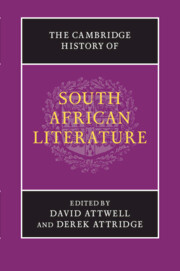Book contents
- Frontmatter
- Introduction
- PART I ORATURES, ORAL HISTORIES, ORIGINS
- PART II EXPLORATION, EARLY MODERNITY AND ENLIGHTENMENT AT THE CAPE, 1488–1820
- PART III EMPIRE, RESISTANCE AND NATIONAL BEGINNINGS, 1820–1910
- PART IV MODERNISM AND TRANSNATIONAL CULTURE, 1910–1948
- PART V APARTHEID AND ITS AFTERMATH, 1948 TO THE PRESENT
- 19 The fabulous fifties: short fiction in English
- 20 Writing in exile
- 21 Afrikaans literature, 1948–1976
- 22 Afrikaans literature after 1976: resistances and repositionings
- 23 The liberal tradition in fiction
- 24 Black Consciousness poetry: writing against apartheid
- 25 Popular forms and the United Democratic Front
- 26 Writing the prison
- 27 Theatre: regulation, resistance and recovery
- 28 The lyric poem during and after apartheid
- 29 Writing and publishing in African languages since 1948
- 30 Writing the interregnum: literature and the demise of apartheid
- 31 Rewriting the nation
- 32 Writing the city after apartheid
- PART VI SOUTH AFRICAN LITERATURE: CONTINUITIES AND CONTRASTS
- Index
- References
24 - Black Consciousness poetry: writing against apartheid
from PART V - APARTHEID AND ITS AFTERMATH, 1948 TO THE PRESENT
Published online by Cambridge University Press: 28 January 2012
- Frontmatter
- Introduction
- PART I ORATURES, ORAL HISTORIES, ORIGINS
- PART II EXPLORATION, EARLY MODERNITY AND ENLIGHTENMENT AT THE CAPE, 1488–1820
- PART III EMPIRE, RESISTANCE AND NATIONAL BEGINNINGS, 1820–1910
- PART IV MODERNISM AND TRANSNATIONAL CULTURE, 1910–1948
- PART V APARTHEID AND ITS AFTERMATH, 1948 TO THE PRESENT
- 19 The fabulous fifties: short fiction in English
- 20 Writing in exile
- 21 Afrikaans literature, 1948–1976
- 22 Afrikaans literature after 1976: resistances and repositionings
- 23 The liberal tradition in fiction
- 24 Black Consciousness poetry: writing against apartheid
- 25 Popular forms and the United Democratic Front
- 26 Writing the prison
- 27 Theatre: regulation, resistance and recovery
- 28 The lyric poem during and after apartheid
- 29 Writing and publishing in African languages since 1948
- 30 Writing the interregnum: literature and the demise of apartheid
- 31 Rewriting the nation
- 32 Writing the city after apartheid
- PART VI SOUTH AFRICAN LITERATURE: CONTINUITIES AND CONTRASTS
- Index
- References
Summary
We have set out on a quest for true humanity, and somewhere on the distant horizon we can see the glittering prize. Let us march forth with courage and determination, drawing strength from our common plight and our brotherhood. In time we shall be in a position to bestow upon South Africa the greatest possible gift – a more human face.
(Biko, quoted in Van Wyk, We Write What We Like, p. 24)This chapter seeks to explore the interconnections between the philosophy of Black Consciousness in South Africa and English poetry published in the 1960s and 1970s by the four black African poets who, over the years, have been given the status of representing Black Consciousness by critics and editors of poetry anthologies. Taking the form of a wide-ranging critical overview, the chapter focuses on selected poems illustrating particular themes and perspectives, as well as poetic techniques and conventions in the poetry of this era.
Steven Bantu Biko's prophetic words quoted above remind us that Black Consciousness is essentially a philosophy of humanity (ubuntu) and national redemption. In line with his conception of Black Consciousness as a regenerative and redemptive philosophy, Biko's definition of blackness is both pragmatic and all-embracing:
We have in our policy manifesto defined blacks as those who are by law or tradition politically, economically and socially discriminated against as a group in the South African society and identifying themselves as a unit in the struggle towards the realisation of their aspirations.
(Biko, I Write What I Like, p. 62)For Biko and other proponents of Black Consciousness, blackness does not merely denote skin pigmentation but is ‘a reflection of a mental attitude’. It is as a consequence of this unambiguous and strategic conception of ‘blackness’ that Indian, coloured and black African poets wrote poems tackling various aspect of ‘black experience’ in apartheid South Africa.
- Type
- Chapter
- Information
- The Cambridge History of South African Literature , pp. 500 - 522Publisher: Cambridge University PressPrint publication year: 2012
References
- 4
- Cited by



